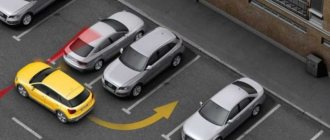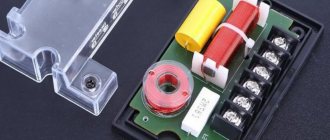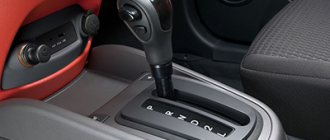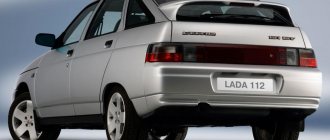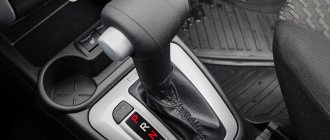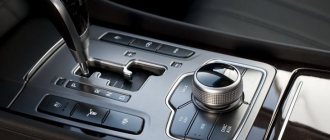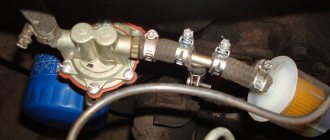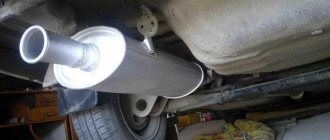Automatic parking is an intelligent assistant for safely parking your car. It is a parking autopilot, although partial driver participation is sometimes required. As a rule, the car pulls into the parking lot on its own, having previously selected a suitable place, while the “steering wheel” presses the pedals and changes gears.
This option greatly simplifies the process of maneuvering a wheelbarrow in difficult locations. Beginners driving cars with automatic parking have the opportunity to calmly “stall the horse” without worrying about the integrity of the body or the safety of neighboring cars.
Let's look at how the automatic car parking system works in more detail. The option is present on many brands of cars today. However, almost 15 years ago it was first presented at Volkswagen. Therefore, it is on the example of these cars that we will study it today.
What is automatic parking?
The intelligent security complex “Service Park Assist System” or Volkswagen automatic parking is an autopilot mode during parking operations. The car parks independently parallel and perpendicular to the roadway, driving forward and backward. Park Pilot is available on the following vehicles: Golf, Passat B8, Passat CC, Tiguan, Teramont, Jetta and Touareg.
The assistant also searches for a suitable parking space, coordinating the result with the driver. Some complexes also provide assistance when leaving the parking lot.
System design
Automatic parking of a driverless car works using ultrasonic sensors and receivers. Reminds me of the operating principle of the parking sensors system, doesn’t it? However, parking sensors have a longer range.
The sensors emit waves and then pick up the return signal. The control unit processes the information and calculates the distance to objects, and then gives a command to move. All maneuvers are performed accurately and without the risk of collision. In total, Volkswagen's Service Parking Assist complex has 12 sensors (4 each in front and rear, 2 on the sides of the car).
The algorithm for the operation of sensors during automatic parking is completely built up by the electronic control unit.
The option is turned on and off by the driver. He can interrupt the process at any time. You can monitor the scheme and progress of maneuvering on the display of the standard GU. The required commands are also displayed there.
Automatic parking system (another name is intelligent parking assistance system, the common name is parking autopilot) refers to active parking systems, because provides car parking in an automatic or automated mode (separate functions are performed automatically).
The evolution of parking systems: from parking sensors to automatic parking systems.
The process of parking and maneuvering in a confined space is difficult for both a novice and an experienced driver. The main problem with parking is the inability to see the extreme points of the car from the driver's seat and assess how far away the obstacles are. This problem became most acute about twenty years ago, when there were more and more cars, and fewer and fewer parking spaces.
The first practical solution to the problem was presented in 1995 - then Mercedes-Bens introduced a system called Parktronic. It was a system of several ultrasonic sensors and an indicator - a beeper. This system worked extremely simply: sensors measured the distance to obstacles, and a beeper, by changing the frequency of the sound signal, warned when to stop.
This system showed its best performance, although it lacked a good and convenient alarm when approaching an obstacle. Therefore, very soon parking sensors with visual LED indication appeared. At first, this indication consisted of three LEDs, the color of which indicated the approximate distance to the obstacle: green - you can move, yellow or orange - danger is close, red - you need to stop.
As practice has shown, parking sensors with ultrasonic sensors and visual indications are simple, convenient and reliable, which is why they are widely used today. Although in recent years they have been improved, becoming more sensitive and comfortable. As for the display, it has become more informative - even in simple parking sensors, indicators show the distance to obstacles to the right and left of the car, in many parking sensors the display shows everything that happens around the perimeter of the car, etc.
However, parking sensors, even with the most advanced display, are not always able to completely replace the driver’s eyes. For example, when parking a truck, bus or large vehicle, you simply need to see what is happening behind you, so in such cases, parking and maneuvering is often done with the help of an assistant.
A solution to this problem was also proposed in the 1990s, it was parking sensors with a rear view camera. Attempts to create such a system have been proposed for a very long time (since the 1950s), but only recently has technology made it possible to create a small-sized camera, a lightweight monitor and electronics that could easily fit in a passenger car. It is interesting that the first parking sensors with a rear view camera began to be used on trucks and buses, and only with the beginning of the new millennium did they gradually migrate to passenger cars.
The first parking sensors of this type were equipped with one camera located in the rear of the car - such systems are very popular now, as they are simple, reliable and provide enough information to the driver. In 2000, a system with a retractable rotating camera appeared, which made it possible to inspect the area around the car. And since 2007, all-round viewing systems have been produced (the first was created by Nissan), which use 4 wide-angle cameras covering the entire space around the perimeter of the car.
But all of these are passive parking systems, they only help to see and “feel” the space around, but they leave the most difficult work - maneuvering - to the driver. Now this problem is solved by automatic parking systems, which perform all the work - from searching for free space (Fig. 1) to placing and leaving the car from a parking space - without the help of a driver.
Fig.1 Finding a parking place
The first automatic parking systems were created in the mid-2000s by several automobile companies, and since then they have been developing rapidly and becoming more and more intelligent. While the first systems could only fit into a fairly spacious pocket, today they can park a car almost anywhere, regardless of how other cars are parked.
Today, automatic parking systems have not yet become as widespread as conventional parking sensors, although the reason is clear - these types of systems are quite expensive, so they are included as options or standard systems only in cars in the above-average price category.
Types and methods of parking.
Various automatic parking systems help in parallel parking, perpendicular parking. Parallel parking systems are more common. Automatic parking is carried out through coordinated control of the steering wheel angle and vehicle speed.
Known types of intelligent parking assistance systems:
Park Assist on Volkswagen cars;
Park Assist Vision on Volkswagen cars;
Intelligent Parking Assist System on Toyota, Lexus cars;
Remote Park Assist System on BMW vehicles;
Active Park Assist on Mercedes-Benz, Ford cars;
Advanced Park Assist on Opel cars.
Design.
The design of an automatic parking system (Fig. 2) includes ultrasonic sensors, a switch, an electronic control unit, as well as actuators of vehicle systems.
Fig.2 Design of automatic parking system
1 – Parking assistance system module; 2 – Front and rear speakers; 3 – Front parking assist sensor; 4 - Parking assistance switch; 5 – Integrated Control Module (ICM); 6 – Power amplifier; 7 – Rear parking assist sensor.
The intelligent parking assistance system uses ultrasonic sensors, similar to the passive parking system (Fig. 3), but with a longer range (up to 4.5 m). The number of sensors varies depending on the type of system. For example, in the latest generation Park Assist system, 12 ultrasonic sensors are installed: 4 in front, 4 in the rear and 4 on the sides of the car.
Rice. 3 Passive parking system
The system is turned on forcibly when parking is necessary. For this purpose, there is a special switch on the instrument panel (steering wheel).
The electronic control unit receives signals from ultrasonic sensors and converts them into control actions on actuators, which are other vehicle systems: directional stability, engine control, electric power steering, automatic transmission. Interaction with these systems is carried out through the corresponding electronic control units.
The information required for automatic parking is displayed on the information display and is used by the driver during the parking process.
Stages of an automatic parking system.
The operation of the automatic parking system can be divided into two stages (Fig. 4): searching for a suitable parking space and actually parking.
Rice. 4 Stages of automatic parking
Finding a suitable parking space.
Produced using ultrasonic sensors (Fig. 5). For example, the design of the Park Assist system provides four side ultrasonic sensors for this purpose - two on each side of the car. When a car moves along a row of parked cars at a certain speed (up to 40 km/h for parallel parking and up to 20 km/h for transverse parking), sensors record the distance between them, and in the Park Assist Vision system, their position relative to the vehicle (parallel or perpendicular).
Rice. 5 Finding a suitable parking spot
The sensor signals are processed by an electronic control unit. If the parking distance is sufficient, the system sends a signal to the driver and displays the relevant information on the vehicle's information display. In the Park Assist system, a sufficient distance for parking is taken to be a distance exceeding the length of the vehicle by 0.8 m, in the Advanced Park Assist system - by 1 m.
Vehicle parking.
It can be carried out in two ways - directly by the driver using instructions provided by the system or automatically without driver participation (Fig. 6).
Rice. 6 Vehicle parking
Visual and test instructions are provided to the driver on the information display. They relate to recommendations for turning the steering wheel at a certain angle and direction of movement. This method of automated parking is used in the Advanced Park Assist system.
Actuating elements involved in automatic parking.
Automatic parking is carried out by orderly influencing the actuators of the vehicle systems:
— electric motor for electric power steering;
— return pump and brake valves of the stability control system;
— electric motor of the throttle valve of the engine control system;
— electromagnetic valves of the automatic transmission.
For the purpose of traffic safety, the system can always be switched from automatic mode to manual mode. In the latest system designs, automatic parking can be performed while the driver is both in the car and outside it - with the key.
Operating principle, data transmission, signal processing.
When the parking assist module activates the system, the switch LED turns on and a single beep sounds from the front and rear speakers to indicate that the system is operating. The parking assist module processes the signals received from the sensors to determine whether there is an object within the range of the sensors. In combined mode, the sensors emit a series of ultrasonic pulses and then switch to the mode of receiving sound reflected from an obstacle within the range. The received reflected signals are amplified and converted from analogue to digital form in the sensor itself. The digital signal passes to the parking assist module and is compared with the programmed data located in the module's EEPROM. The control module receives this data from the sensor via the signal transmission line and calculates the distance to the obstacle based on the time interval between the irradiation of the obstacle and the reception of the reflected signal. The pulse duration is determined by the module, which uses a sensor to control the frequency of the output pulse.
In receiver mode, the sensor receives pulses emitted by neighboring sensors. The control module uses this information to accurately determine the position and distance to the obstacle. If no obstacles are detected, there are no additional warning signals. If an obstacle is detected, repeated beep sounds are emitted from the corresponding front or rear speakers. The signal interval decreases as the distance between the obstacle and the vehicle decreases. At a distance of approximately 250 mm the sound signal becomes continuous.
If, after the initial detection of an obstacle, the distance between it and the vehicle does not decrease, the sound of the warning signal remains unchanged if the obstacle is detected by the central sensor, or the signal stops sounding after 3 seconds if the obstacle is detected by the corner sensor. The audible signals stop if the vehicle is moved out of reverse gear. The module continues to monitor the distance and resumes issuing warning signals if a decrease in distance is detected. The system is canceled when the parking assist switch is pressed or the ignition is turned off. The system is also canceled if the vehicle moves more than 50 m or the forward speed of the vehicle exceeds 30 km/h. The system can detect the connection of a trailer to the vehicle using a medium-speed CAN bus message from the trailer module. When the Parking Assist module detects that a trailer is connected to the vehicle, the rear sensors are disabled to prevent continuous warnings due to the proximity of a trailer. The parking assist module also contains software that compensates for the effects of frost, ice or rain on the sensors. Ice compensation occurs if the outside temperature value received in the medium-speed CAN bus message from the instrument panel is less than 6°C.
Interaction of control units and components (Fig. 7)
Rice. 7 Control units and components
Note: A – permanent wired connection; N – Medium-speed CAN bus; P – Fiber optic bus MOST
1 – Battery; 2 – Electrical distribution box; 3 – Auxiliary electrical distribution box; 4 – Central junction box (CJB); 5 – Transmission control module (TCM); 6 – Anti-lock braking system (ABS) module; 7 – Trailer module; 8 – Integrated Control Module (ICM); 9 – Power amplifier; 10 – Front speakers of the audio system; 11 – Rear audio system speakers; 12 – Rear parking assist sensor; 13 – Parking assistance module; 14 – Parking assistance switch; 15 – Front parking assist sensor.
Features and disadvantages of the system:
— Low speed of maneuvers. The system performs all actions and maneuvers slowly, at minimum speed, so automatic parking may take longer than manual parking; — System errors when identifying obstacles. Quite often, automation does not recognize curbs, snowdrifts, posts and other obstacles, which leads to unpleasant consequences; — Incorrect operation of the system due to weather conditions and environmental factors. Errors can be caused by dirty sensors, heavy snowfall or rain, which should always be kept in mind.
Sources:
- https://systemsauto.ru/active/active_park.html
- https://vkjournal.ru/doc/104687
- https://www.lrman.ru/freelander/2/electrics/parking/principles_of_parking_assistant
- https://www.autoopt.ru/articles/products/4528605/
- https://auto.mail.ru/article/26175-novye_mercedes_a_v_i_s/
Types of autopilot
In total, there are 2 main types of automatic parking:
- Fully automatic. Parking is done without the participation of the driver, and he can intervene at any time. The intelligent assistant chooses the parking spot, decides how to get there, and performs the maneuvers itself.
- Semi-automatic The choice of course and control of the steering wheel is carried out by the parking assistant. The driver monitors the speed and brake pedals, and also changes gear. At the same time, recommendations and tips are displayed on the monitor.
Car without parking assistance systems
Every modern driver started driving a car that was not equipped with parking assistance systems. Training in driving schools is allowed only in cars that do not have parking systems. That is why every driver knows how to park a car “using the mirrors.”
In practice, the absence of parking assistance systems does not cause any particular problems; the car can be parked without them. Moreover, this can be done very carefully; parking will just take a little longer. In addition, many drivers do not understand the benefits of installing parking sensors or a rear view camera. Therefore, the number of cars not equipped with parking assistance systems remains quite impressive.
However, almost all modern cars have at least a rear parking sensor as a factory option.
What brands of cars have automatic parking?
Today, an intelligent automatic parking system is present in almost all car manufacturers. Only the name is different everywhere:
- Park Assist for Volkswagen;
- Active Park Assist for Mercedes and Ford;
- Audi Parking System;
- BMW Remote Park Assist System;
- Advanced Park Assist for Opel;
- Intelligent Parking Assist System for Lexus and Toyota;
- Smart Parking Assistant System from KIA.
How it works?
The general principle for all automatic parking is the same:
- The driver activates the option, usually by pressing a button on the car panel;
- Next, he slowly drives along the right lane of the road, and at this time the parking system scans the area for free space;
- By default, the search is carried out on the right side of the road, but if the driver turns on the left turn signal, scanning will also start on the left side of the road;
- As soon as a free space is detected, the system will notify the driver.
- If the latter is satisfied with everything, he will confirm his consent to parking;
- Next, you need to follow the prompts on the radio display and strictly follow them;
- In about 3-7 maneuvers the car will park.
Operating principle of intelligent parking systems
After pressing the system activation key, the control unit begins to work, receiving data from sensors and calculating the optimal trajectory of movement, taking into account its current spatial position. After this, the corresponding commands are transmitted to the actuators that are part of the complex called the autopilot.
The operation of the car parking system is impossible without coordination with many other electronic systems (vehicle directional stability, control of the operation of the power unit, automatic transmission, electric power steering, etc.). The main control unit has assistants who are responsible for interacting with other electronic systems.
Schematically, the operation of an automated parking system can be divided into two stages: searching for a free parking space and actually performing the maneuver.
How to use (using Volkswagen as an example)
Here are more detailed instructions, for example, for the parking assistant in the 2022 Volkswagen Touareg:
- We have already written how to turn on the parking assistant; VW has everything like others - a button on the panel;
- Drive slowly along the parking row, making sure that the distance to the nearest parked cars is 0.5-2 m;
- For longitudinal parking, the speed should not exceed 40 km/h, for transverse parking – 20 km/h;
- As soon as the system finds a suitable location, a corresponding notification will appear on the monitor. Give consent (P key);
- Then all you have to do is press the accelerator and brake pedals in time, and also engage reverse and forward gears in time.
Please refer to your vehicle's technical manual for more detailed instructions. As a rule, the Park Assist system on a Volkswagen Tiguan, Teramont or any other works the same.
Pros and cons of automatic parking
- The most important advantage, of course, is the comfort that the driver of a car with a parking autopilot receives;
- Beginners take the opportunity to learn how to park correctly, feel the dimensions of their car, and develop the skill of maneuvering when driving in reverse;
- The parking process becomes completely safe, with virtually no risk of damaging your own or neighboring cars.
Unfortunately, the system is not without its drawbacks:
- The sensors are too sensitive to the environment. They are afraid of moisture, dust, snow, ice. They need to be carefully looked after. But this applies to any car device (even the rear view camera needs protection);
- Uneven road surfaces (cobblestones, potholes) can interfere with the ultrasound sensors. The system will not work correctly. Remember how in such a situation the parking sensors constantly beep? It's about the same here;
- The sensors “do not see” open hatches, trailer drawbars, thin posts and rods, poles, narrow trees;
- Cars equipped with this option are significantly more expensive than similar ones, but with a simpler configuration;
- Repairing automatic parking is not a cheap pleasure. You can replace the same parking sensors yourself and get away with a modest sum.
Unfavorable conditions for autopilot activation
In conclusion, let’s consider in what cases automatic parallel or transverse parking on a Volkswagen Tiguan, or any other, can fail:
- If neighboring cars are parked unevenly, not parallel to the curb;
- If the distance from a car with automatic parking to parked cars (on the side) is less than 0.5 m;
- The presence of a trailer on a neighboring car;
- High ground clearance (distance from the bottom of the car to the road surface) of the neighboring car. The autopilot sensor may not “notice” such a car;
- If there are irregularly shaped vehicles, trash cans, garbage cans, narrow trees, poles, bicycles, motorcycles, etc. nearby;
- It is worth considering that ultrasound can be affected by unfavorable weather: rain, snow, mud.
That's all for us. Whether it is worth using automatic parking is up to you to decide. Judging by the reviews, experienced drivers are in no hurry to give the computer complete control over the situation. Beginners willingly use the option, saving themselves from unnecessary stress. Which camp will you join?
Advantages and disadvantages
Like many innovations, this feature has its pros and cons. The advantages include the following:
- correct and safe parking of a car even without sufficient driver skills;
- It takes less time to find a parking space and park. The car itself finds a parking space and can park in a space where there is 20 cm left to neighboring cars;
- you can control parking from a distance using the remote control;
- The system starts and turns off with the press of a button.
But it also has its downsides:
- cars with an automatic parking system are more expensive compared to similar cars without it;
- for the system to work, the car must meet the technical equipment (power steering, automatic transmission, etc.);
- in case of breakdown or loss of system elements (remote control, sensors), restoration and repair will be expensive;
- the system does not always correctly determine parking opportunities and for it to work correctly, certain conditions must be met.
Automatic parking has in many ways become a breakthrough in the automotive industry. It greatly facilitates parking in the busy rhythm of large cities, but it also has its drawbacks and operating conditions. Undoubtedly, this is a useful and practical feature of modern cars.
